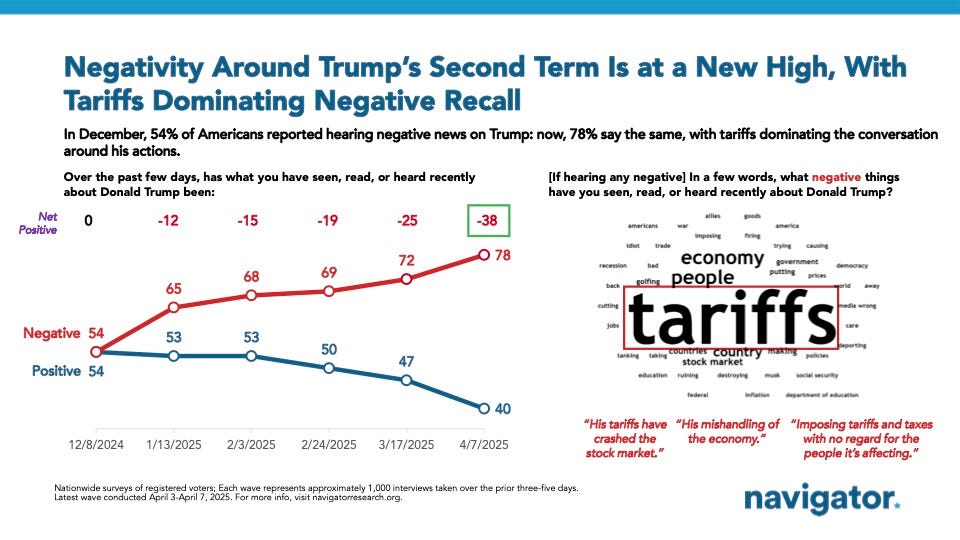Trump’s trade war Clifford Young, Sarah Feldman and Bernard Mendez, Ipsos In the New America, things change fast, and this past week has been no exception. There is a lot of uncertainty as the public absorbs the latest twists and turns on trade and tariffs; this is a story that towers over everything else.
Consumer sentiment fell for the fourth straight month Survey Research Center, U. of Michigan Consumer sentiment fell for the fourth straight month, plunging 11% from March. Sentiment has now lost more than 30% since December 2024 amid growing worries about trade war developments that have oscillated over the course of the year. The share of consumers expecting unemployment to rise in the year ahead increased for the fifth consecutive month and is now more than double the November 2024 reading and the highest since 2009.
Trump’s economic approval sinks to all time lows as Americans blame tariffs for volatility and grocery costs Maryann Cousens, Navigator Research This Navigator Research report covers perceptions of Trump’s handling of the economy, tariffs, and how Trump’s policies are seen as affecting the stock market and the costs of everyday goods.
Economic Outlook Dives Just Three Months Into Trump’s Term Paul Kiernan and Anthony DeBarros, Wall Street Journal [unlocked] Probability of a recession leapt while growth outlook slumped, survey of economists finds
Breaking Through the Noise on Trump’s Chaotic First Two Months Jim Kessler and David de la Fuente, Third Way Third Way with GBAO conducted an online survey of 2,000 registered voters from March 17 to 23, 2025. This poll set out to understand which of Trump’s actions were most salient with voters and what specific messages were most effective in moving Trump supporters, Independents, and non-college voters—a set of voters that can overlap. How U.S. tariffs set social media on fire around the world Ben Meyerson, Ipsos Social media’s reaction to President Trump’s threat of substantial tariffs was almost universally negative, according to data from Ipsos Synthesio. How American opinion has changed since World War II about the incarceration of U.S. residents of Japanese ancestry Kathy Frankovic, YouGov In February 1942, approximately 120,000 people of Japanese ancestry living in the West Coast of the U.S. — most of whom were American citizens — were evicted from their homes and sent to guarded military camps. Today, Americans are more likely to look negatively than positively at the transfer of West Coast residents and their incarceration — especially the transfer of those that were U.S. citizens of Japanese ancestry.
Young Americans' favorite podcasts reveal a stark partisan split Erica Pandey, Axios Young people are starkly divided by who they vote for, what they do for fun and where they get their news and information, according to new Axios-Generation Lab polling. How popular is Elon Musk? Nate Silver and Eli McKown-Dawson, Silver Bulletin Silver Bulletin favorability ratings for the world's richest man.







